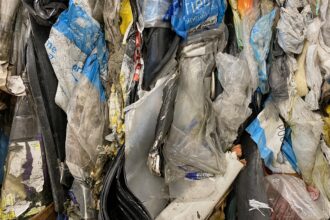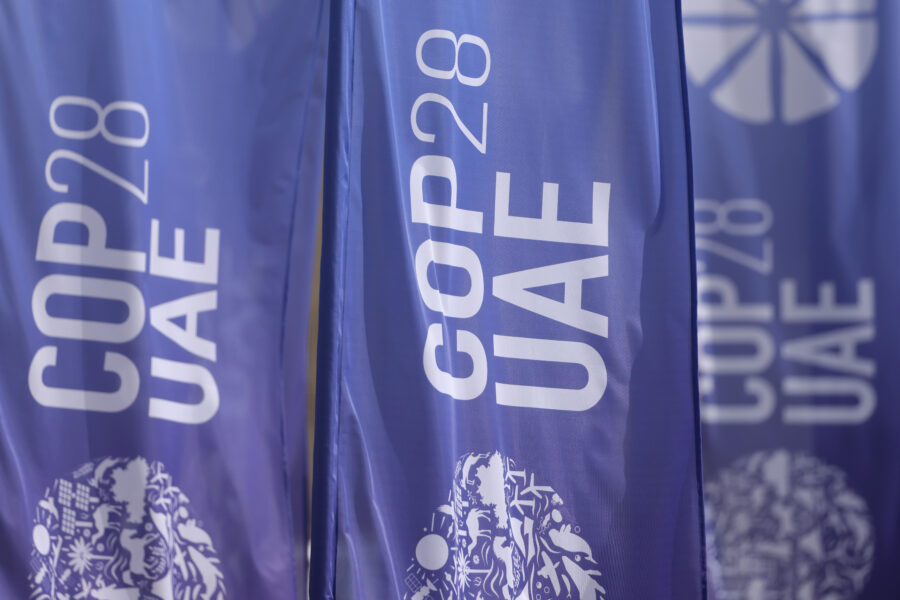Delegates from more than 175 countries are gathered in Nairobi to advance a potential diplomatic solution to a global plastic pollution crisis amid a growing awareness of the effect of plastic on the environment and human health.
An often described “miracle product,” plastic in its many forms has become ubiquitous in the global economy, used to make lightweight and durable parts for cars, trucks and airplanes, and life-saving medical supplies and equipment, but also packaging that is opened and tossed aside in minutes.
As such, millions of tons of this discarded waste have become a pervasive menace, choking streams, lakes and oceans, killing wildlife and, in tiny particles called nanoplastics, finding its way into the blood and placental fluids of human beings all over the planet.
In one new peer-reviewed study published in the journal Science of the Total Environment, Purdue University scientists found that plastic-induced eating difficulties of tiny zooplankton at the base of nature’s food web were limiting the aquatic organism’s ability to control algal proliferation, a serious water quality concern.
The United Nations Environment Assembly in March 2022 launched a two-year effort to reach a global agreement to stop plastic pollution, and since then, an Intergovernmental Negotiating Committee has met twice toward that end.
A third negotiation session starts Monday in Nairobi, after a pre-session by the United Nations Environment Program (UNEP) on Saturday.
“Plastics and raw materials used in plastics and plastic waste, are widely traded across boundaries, and they have trans-boundary effects, so they really need to be regulated at the international level,” said Aaron Wu, a London-based expert in international environmental law with the British multinational law firm Slaughter and May.
Countries have recognized that no existing treaty regulates the entire plastics lifecycle and now agree that is something they need to do, said Wu, a former trade and environmental policy advisor to the Australian government.
In September, UNEP released what it calls the “zero draft” of a potential agreement, a first step toward a final document that begins to provide a framework. With the zero draft, Wu said, “we’re starting to see huge areas of convergence” as well as “areas of divergence.”
One potential outcome of the Nairobi meeting could be an agreement to write a formal first draft of a plastics treaty to be discussed at the fourth negotiation session scheduled for April in Ottawa, Canada.
The goal is to have an international plastics agreement by the end of 2024, a fast process for any global agreement.
“I think that remains an ambitious goal,” said Nick Mallos, vice president for conservation at the Ocean Conservancy, an environmental advocacy group that leads an international coastal cleanup annually. “I think it is doable, and I think Nairobi will be critical,” he said, adding that it will provide a “real gut check” on whether high levels of ambition are realistic. “Coming out of Nairobi, we will have much greater clarity there,” he said.
U.S. Looks for a Middle Ground
Chemical companies make 460 million tons of plastic annually, an amount that could triple by 2060. Globally, less than 10 percent gets recycled.
UNEP has said the impacts of plastic production on climate change, nature loss and pollution are potentially catastrophic, citing:
- By 2050, greenhouse gas emissions associated with plastic production, use and disposal would account for 15 percent of allowed emissions, missing the Paris climate agreement goal of limiting global warming to 1.5 degrees celsius.
- Plastic waste is wreaking havoc on the environment as millions of tons of plastic waste flow annually into the oceans.
- Exposure to plastics can harm human health, potentially affecting fertility, hormonal, metabolic and neurological activity.
In an analysis for the American Society of International Law, Wu identified a dozen areas where the zero draft reveals at least some measure of emerging agreement.
They include a desire for the agreement to address toxic chemicals in plastics that are particularly concerning, product design and composition, pollution effects throughout the plastic lifecycle and waste management. Delegates to the talks also appear to be coalescing around “extended producer responsibility,” which could make plastic makers legally and financially responsible for mitigating the environmental impacts of their products and packaging.
Still undecided is how to fund provisions of a plastics treaty, which could cost trillions of dollars from 2025 to 2040, according to one recent estimate from the Nordic Council of Ministers for the Environment and Climate. A “business as usual scenario,” the council said, would cost even more.
A plastic pollution fee could be slapped on plastic producers, contributions could come from the public sector, or there could be a combination of the two.
Financing questions also delve into matters of equity. The World Wildlife Fund issued a report last week that found middle- and low-income countries, despite consuming less plastic, incur a total lifetime plastic cost that is eight to 10 times higher than wealthier countries.
Those costs come in the form of greater exposure to pollution from plastic waste itself, and to exposure of pollution caused by the production of plastics, including impacts from oil and gas development and petrochemical manufacturing. The report concluded that countries with less wealth will need financial help to address their plastic waste burdens.
Delegates must also decide whether the agreement will rely on participating countries to come up with their own national action plans to reduce plastic pollution, and how many of the agreement’s provisions should be mandatory, such as caps or limits on plastic production.
A self-described High Ambition Coalition to End Plastic Waste, made up of dozens of countries and the European Union, has in recent weeks reiterated its call for “binding provisions in the treaty to restrain and reduce the consumption and production of primary plastic polymers to sustainable levels,” as well as to “eliminate and restrict unnecessary, avoidable, or problematic plastics, as well as the plastic polymers, chemical constituents and plastic products that are of particular concern due to their adverse effects on the environment and human health.”
The United States has been criticized by some environmental advocates as being part of a “low ambition coalition” with other fossil fuel producing or plastic making countries like Saudi Arabia and China, and has emphasized the need for flexibility to get maximum buy-in.
Wu said the U.S. appears to be looking for a middle ground that reflects the extremely polarized politics in the United States.
A State Department spokesperson said in a written statement last week that the agreement should include “meaningful and feasible universal obligations” for participating countries “to reduce plastic pollution throughout the lifecycle of plastic, from upstream to downstream. National action plans are an essential mechanism for facilitating implementation and reporting on universal obligations. For national plans to be effective, their content cannot be completely discretionary.”
The statement emphasized the need to develop “more circular approaches” to solve the plastics crisis, echoing an emphasis by the petrochemical industry on so-called “advanced” recycling.
“A more circular system keeps materials, products, and services in circulation for as long as possible; reduces material use; and redesigns materials, products, and services to be less resource intensive,” the State Department statement said.
Battle Rages Over Chemical Recycling of Plastics
Once formal proceedings begin in Nairobi, delegates will find themselves in the midst of a debate over advanced recycling between environmental advocates and industry representatives.
Big Oil and the chemical industry are promoting advanced recycling as a way to help divert plastic waste from landfills and to offset the use of virgin fossil fuels for plastic production. Advanced, or chemical, recycling refers to a range of technologies that take waste plastic and turn it into chemical building blocks of new plastic, and often new fossil fuels and char, a waste residue.
The Environmental Protection Agency currently regulates two of these technologies—gasification and pyrolysis—as forms of plastic incineration. Environmentalists also argue that chemical recycling is in reality incineration—an energy intensive and polluting form of greenwashing that locks in a fossil fuel future at the expense of public health and the planet.
Last week, 240 environmental groups, including the Natural Resources Defense Council, Earthjustice, Greenpeace, Oceana and the Sierra Club, wrote a letter to President Joe Biden calling on his administration to end all support, including issuing permits, for chemical recycling of plastics.
“The chemical industry’s big lie is that it can solve the plastic crisis by incinerating plastic waste,” said Daniel Rosenberg, director of federal toxics policy for NRDC. “Anyone who has ever accidentally burned even a tiny bit of plastic on the stove knows that this is both ludicrous and dangerous.”
While the zero draft did not include a definition or discussion of advanced or chemical recycling, it did include recycling definitions that precluded turning plastic into fuel or using plastic for energy production.
A plastics treaty could, in the end, be silent on chemical recycling, relying on or referring to other global agreements or guidance that may have already been developed, such as the 1989 Basel Convention, which seeks to protect people and the planet from the adverse effects of hazardous wastes.
Earlier this year, delegates negotiating a revision to technical guidelines for the Basel Convention did not accept language endorsing chemical recycling as a tool for managing plastic waste, at least for now.
“What we saw is certain petrochemical interests, that is countries with significant petro and oil interests, promoting chemical recycling,” said Lee Bell, International Pollutants Elimination Network science policy advisor. Bell is the lead author of a new report from IPEN and Beyond Plastics on chemical recycling in the United States, “Chemical Recycling: A Dangerous Deception.”
“We also saw a really significant number of other countries, particularly in the global south (and) developing countries reject the idea of adopting this technology,” Bell said. “Because their concern is that once there’s a foothold for this type of technology, they will find themselves the recipient of the processing facilities, the hazardous waste and the emissions, and they don’t want it,” he said.
Still, delegates left chemical recycling language in the Basel Convention’s technical guidance enclosed in brackets, meaning those paragraphs have no authority now but the debate over them will likely resurface in subsequent meetings.
Even though environmental advocates would like to see the United States delegation work to shut the door to chemical recycling of plastics, the statement this week from the State Department shows the U.S. wants to keep that door open.
With so little plastic being recycled, chemical recycling could be a potential option, the State Department spokesperson said. “If it can be done in an environmentally sound manner, chemical or advanced recycling could play a role in the solution to this problem and create a more circular system for the lifecycle of plastic,” the spokesperson said. “We are looking to better understand the technology and how it could fit into global efforts to combat plastic pollution.”
Treaty Talks: “Once in a Lifetime” Opportunity
Environmental and industry groups alike are weighing in on the potential treaty in the runup to the Nairobi meeting.
“The zero draft lays out a bold plan to transform the entire scope of production, use, and management of plastics, which will generate significant progress toward a more circular economy,” said Kate Bailey,
chief policy officer of the Association of Plastic Recyclers, an international trade group whose members are involved in recycling plastic. “The APR is pleased to see that the zero draft solidifies the importance of recycling and the use of safe recycled content in plastic products to replace virgin plastics.”
Last week, Corporate Accountability, a nonprofit watchdog of transnational companies, published a report that acknowledged big consumer brands, including Coca-Cola, PepsiCo and McDonalds, have made a significant number of voluntary pledges to fight or reduce plastic pollution and meet sustainability goals.
But the group said that it is difficult to independently corroborate the three companies’ efforts, and said voluntary measures are not up to the task of solving the global plastics crisis and could undermine efforts to secure a strong treaty.
“The bevy of industry corporate social responsibility initiatives on plastic pollution can deeply color public opinion and political will to advance an ambitious treaty,” said Nick Guroff, a consultant working with Corporate Accountability. “If industry can be trusted to clean-up its own mess, what is the use of binding, transnational regulation?”
Coca-Cola, PepsiCo and McDonalds did not immediately respond to requests for comment on the Corporate Accountability report.
The Business Coalition for a Global Plastics Treaty, of which Coca-Cola and PepsiCo are a part, along with dozens of financial, waste management and other partners, has put out a statement that its members are looking for “legally-binding provisions that require national governments to implement and enforce harmonized regulations over the full life-cycle of plastics.”
Vito Buonsante, a environmental lawyer and technical advisor to the International Pollutants Elimination Network, said the group is pleased that its concerns about toxic chemicals involved in plastic production and use were recognized in the zero draft. “There are provisions on controlling emissions, including hazardous chemicals,” and calls for transparency, he said.
“The treaty initially looked like it was aimed at marine litter” and would focus on “the visible impact of waste,” he said. “There has been an increased understanding of the problems that plastic pollution we are facing. It is significant because it means that countries are listening to scientists and to science.”
Keep Environmental Journalism Alive
ICN provides award-winning climate coverage free of charge and advertising. We rely on donations from readers like you to keep going.
Donate NowMallos, with the Ocean Conservancy, said he is pleased the zero draft included concerns such as microplastics and abandoned or lost ocean fishing gear known as “ghost gear.”
But the group has found the draft lacking by not offering any specific target for reducing plastic production. The Ocean Conservancy, he said, “urges the incorporation of specific global binding targets, such as a minimum 50 percent reduction in single-use plastics production by 2050.”
Other groups go further. The Global Alliance for Incinerator Alternatives (GAIA) calls for the elimination of all single-use plastics, and Greenpeace urges cutting all plastic production by at least 75 percent by 2040.
The Center for International Environmental Law has produced an issue brief arguing that in order to meet Paris climate goals, plastic production will need to be cut between 46 and 70 percent by 2050. CEIL notes that the Scientists Coalition for an Effective Plastics Treaty, a group of experts involved in the U.N. push for a global plastics pact, has found that plastics already account for around 3 percent to 8 percent of global greenhouse gas emissions, with those numbers expected to double by 2060.
The American Chemistry Council, an industry lobby group, did not return requests for comment on the upcoming negotiations. The group opposes limits on plastic production, saying the world needs more lightweight, durable plastics, such as in cars and packaging, to fight global warming by reducing the weight of vehicles and their cargo, thereby reducing transportation emissions, among other reasons.
“Politics aside,” Mallos said, “it is important for us to remember this is a once in a lifetime opportunity for us to right the ship and chart a course toward a future where we as humans are not drowning in plastics and our oceans—and communities that depend on them—are also not drowning in plastic.”













